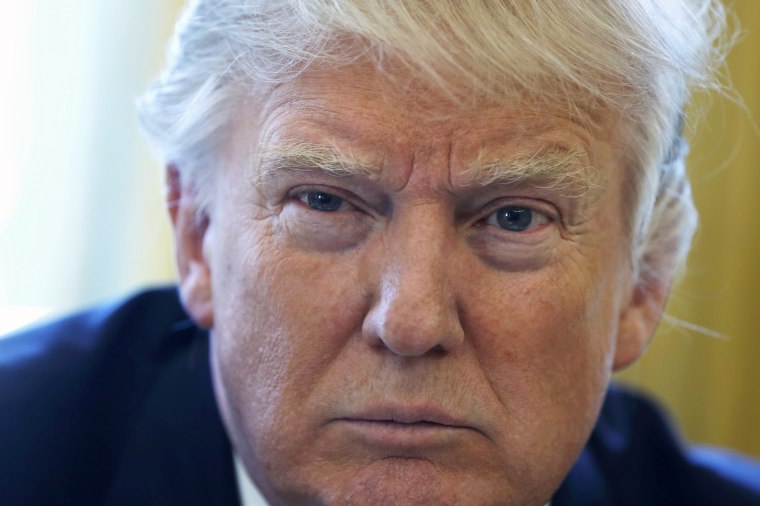The 25th Amendment is the ultimate constitutional "check" — a corrective mechanism for an American president who is physically or psychologically unable to lead. Most important, it grants legal authority to those closest to power — first, the vice president and Cabinet members, then members of Congress — to stage an intervention. At the very least, these individuals are authorized to call a temporary timeout if the president is judged unfit to govern.
Is America today in need of such an unprecedented intervention?
The amendment, ratified in 1967 after President John F. Kennedy’s assassination, was constructed to assure a smooth transition when a president becomes incapable of leadership. (Its vague wording leaves room for both physical and psychological justifications.) By the 1960s, the dangers of an incapacitated president were far greater than at the founding of our country. But arguably, the stakes have only gotten higher. With tensions flaring around the globe, there can be no doubt as to the fitness of the man or woman in possession of U.S. nuclear codes.
Pundits and politicians alike have called for the amendment’s implementation over the past few months. But it is both practically and philosophically a tool of last resort. Unlike impeachment, which is controlled solely by Congress, the 25th Amendment requires action by the majority of the president's Cabinet and potentially Congress. This means that even in today’s polarized climate, partisan removal is unlikely. In addition, the bar for diagnosing mental health conditions is quite high.
It’s crucial to note that having a mental illness does not automatically disqualify a person from serving successfully as president. Indeed, as a Duke University Medical Center study estimates, up to half of the first 37 U.S. presidents displayed clinical features consistent with mental illness at some point in their lives. Two of our 10 most respected presidents, Abraham Lincoln and Thomas Jefferson, displayed symptoms suggestive of depression and anxiety disorders.
So how would one diagnose a sitting president — if it is indeed even possible?
This is uncharted territory
For one approach, a bipartisan congressional caucus could empanel a team of experts to evaluate the president’s condition. But critics argue that mental health conditions are too ambiguous to reliably evaluate. Trying to address a president’s psychological disability, they say, could open the door to partisan use of the 25th Amendment. As Peter D. Kramer and Sally L. Satel argued in The New York Times recently: “The medical profession and democracy would be ill served if a political determination at this level were ever disguised as clinical judgment.”

This claim, however, ignores the existence of an objective process for diagnosing mental health conditions based upon observable behavioral criteria. These rules are set in the fifth edition of the “Diagnostic and Statistical Manual of Mental Disorders,” an authoritative guide that provides an evidence-based approach to diagnosis, drawing upon the behavioral and symptom-related findings in the medical literature and the oversight of 160 world-renowned clinicians and researchers.
When uncooperative or highly disturbed patients are examined, research shows that the diagnostic process can stand up to their resistance by including reviews of medical records (and public documents when available) and by interviewing people who know the patient well.
Older versions of the DSM included diagnoses that were more theoretical; today’s version is research-based, using the expertise of a task force comprised of psychiatrists, psychologists and scientists from around the world. Inconsistencies in the diagnostic process, a reality that exists in all medical fields, are often attributed to the training and experience level of the clinician making the diagnosis, underscoring the importance of using highly trained experts to diagnose serious conditions. Studies also show that the reliability of a diagnosis is strengthened when clinicians are able to look beyond the clinical interview. Essentially, examining historical records and any available public documents increases the accuracy of the diagnosis.
Using this diagnostic guide, “garden-variety” narcissism is unlikely to create psychological unfitness. However, certain personality disorder combinations could become so acute that they do compromise a president’s leadership ability.
Certain personality disorder combinations could compromise a president’s leadership ability.
A president who displayed behavior suggesting the presence of two or more severe personality disorders in, for example, the “Cluster-B” family, could be judged incapable to lead. The Cluster B personality disorders are all marked by impulsive, dramatic and unpredictable behavior. They are typically longstanding patterns resistant to change, even with treatment, and create significant impairment in the way a person thinks, functions and behaves. Additionally, medical studies demonstrate that both genetic risk factors and environmental variables contribute to the development of these personality disorders.
Consider, for example, that a president exhibiting Cluster B behaviors associated with anti-social personality disorder and narcissistic personality disorder would likely struggle to keep calm and think clearly in high-pressure situations. Anti-social symptoms include a disregard for the rights of others, a tendency to break the law, lack of remorse, frequent lying, failure to honor financial obligations, interpersonal exploitation, risk-taking and revenge-seeking in response to perceived slights. Hallmark narcissistic symptoms include an exaggerated self-importance, sensitivity to criticism, lack of empathy, a need for admiration and attention, entitlement and exploitation with a need for personal gain. Together, these symptoms could severely undermine a president’s ability to lead.
Granted, there are self-destructive traits in any individual. But we know for a fact that severe Cluster B behaviors in a leader do pose significant dangers. They might, for example, take drastic measures to avoid humiliation. Extreme examples of this dynamic include cult leaders like David Koresh and Jim Jones, who chose mass suicide over allowing themselves to be arrested in front of their supporters.
The tipping point
Recognizing unfitness in a president does not necessarily mean waiting for a physical sign or even a catastrophic event. Personality disorders present predictable patterns that are well documented in the medical literature. In fact, we can often find the most accurate and honest account of a public figure’s Cluster B symptoms through public records.
Public documentation is important because a president with severe Cluster B traits would likely be inclined to lie about medical conditions. People struggling with anti-social personality issues are usually chronic liars and resistant to seeking treatment. Those with narcissistic conditions are inclined to exaggerate their good health, in spite of evidence to the contrary.
Unlike psychiatrists, clinical psychologists are not bound by the now-infamous Goldwater Rule, which prohibits members of the American Psychiatry Association from diagnosing public figures without a personal assessment. The American Psychological Association’s code of ethics however, strongly discourages psychologists from diagnosing public figures they have not personally examined, and warns that those who do make remarks about public officials to take precautions, making sure their words are aligned with their expertise and the psychological literature, and that they clarify that they have no relationship with the person in question.
Experts have a professional and ethical responsibility to speak up when they notice behaviors that appear troubling.
As an expert in presidential ethics and a clinical psychologist with an expertise in treating patients with personality disorders, respectively, the authors of this editorial have no relationship to President Donald Trump. But due to our collective and relevant experience, we do believe experts have a professional and ethical responsibility to speak up when they notice behaviors that appear troubling or suspect. At the very least, such observations are worthy of further exploration.
Many clinicians have already laid out their own concerns about the president’s psychological health. Nearly 800 mental health professionals have joined a coalition asserting that they are so alarmed by Trump’s mental health that they feel a duty to warn the public. An online petition, intended for mental health professionals who believe the president is unfit to serve, has been signed by roughly 62,000 people.
At this juncture, waiting for unfitness to manifest beyond the types of observable and highly predictive behavior patterns studied by psychiatrists and psychologists is, we believe, naïve. Though remote, we cannot rule out the possibility that a president in a downward mental health spiral could destroy important global partnerships, alter centuries-old alliances and leave the United States vulnerable to terror attacks or war.
The 25th Amendment was created so that those closest to the president could respond in the event of a physical or psychological crisis. In turn, it is the duty of these individuals to be vigilant and act in the best interests of both the president and the citizens who rely on him — because responding to danger from within is as crucial to this nation’s survival as responding to danger from without.
Leanne Watt, Ph.D., is a clinical psychologist practicing in Pasadena, CA. She specializes in the treatment of adults with personality disorders. Follow Leanne on Twitter at @leannewattphd.
Richard Painter has been the S. Walter Richey Professor of Corporate Law at the University of Minnesota Law School since 2007. From February 2005 to July 2007, he was associate counsel to the president in the White House Counsel’s office, serving as the chief ethics lawyer for President George W. Bush.
